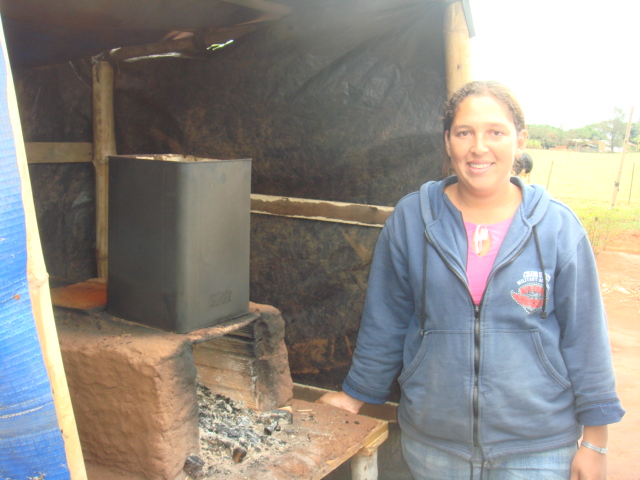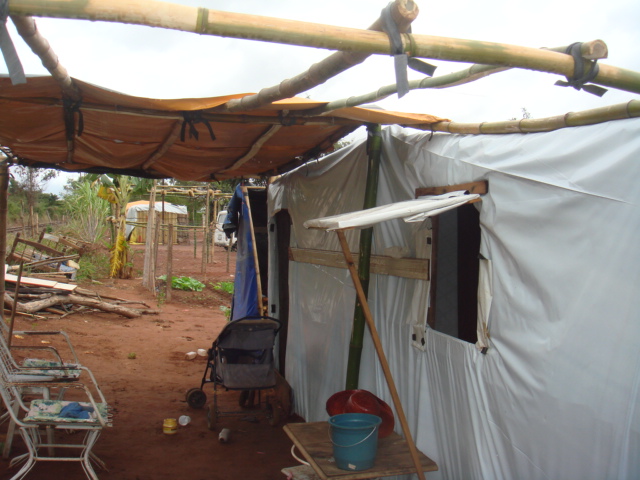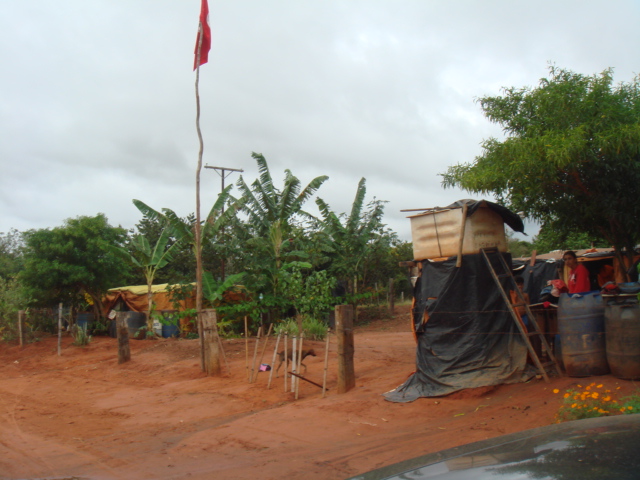A black garbage bag, slightly tattered, blowing in the wind, tied by string to a long tree branch. The young woman sitting underneath it, making herself breakfast. In between the two lanes of traffic, she was living her life paying no notice to those driving past her. To passersby, she was a squatter – unwanted, unsightly, why was she even there? Captivated, I learned she was a “sem-terra,” the derogatory phrase used to signify members of a movement to reclaim land via occupation.
With massive swathes of Brazilian land in the hands of the few, growing numbers of urban and rural people have for decades been leaving unsteady, low-wage jobs or unemployment for self-determination and the pursuit of dignidade or dignity on the land. Brazil’s unique history that has created a chain of inequality spanning the last 518 years. As the largest state in Latin America and 5th largest state in the world, the “Pais para Todos” or “Country for All” is also one of the world’s most unequal states in terms of land distribution. For historical reasons, approximately 1% of Brazil’s 207.7 million people own 45% of all property in the country. This unequal distribution has resulted in an estimated 4.5 million landless families in both urban and rural areas.
Years after first seeing that landless woman’s defiant little lean-to, I think of the lessons we can learn from global struggles to be free from poverty.
Currently living in Chicagoland, a region struggling with gentrification, displacement of entire neighborhoods, and the economic bloodletting of urban “improvement” zones, I watch American-style poverty, forcefully hidden behind various façades, as we dispossess another low-income neighborhood and send more economic refugees packing. I feel haunted by the similarities and questions raised by rural and urban American poverty, and I see approaches to poverty resolution lacking urgency as well as a holistic view of justice. I firmly believe that social justice cannot be achieved without economic justice, and economic justice cannot be achieved without environmental justice. As a result, I believe land reform, and a Right to Land, may offer solutions to poverty in our current system.
We must approach injustice differently.
We must challenge the underpinnings of oppression.
And that is why I believe that there must be an internationally recognized Right to Land.

In spite of its territorial size, Brazil’s productivity potential and ability to equitably house and sustain its population is greatly diminished by inefficient land distribution, thus lowering living standards, employment opportunities, and curbing access to a number of human rights. The frequency of social confrontation and human rights violations both directly and indirectly caused by unequal access to land has increased. Although the 1988 Brazilian Constitution provides for land reform, unjust distribution remains an impediment to the enjoyment of multiple human rights. I can’t help seeing the silenced poverty of Chicagoland in the shadows of the Brazilian landless camps, except the “campers” have identified land as their economic and social linchpin.
Where access to land ensures a greater degree of freedom to achieve self sufficiency, landlessness presents a threat to human rights both directly and indirectly, and as a result, access to land may be considered a key to the realization of human rights and addressing poverty. No explicit right to land exists in international human rights law, yet landlessness negatively impacts access to and enjoyment of a number of fundamental human rights, for example the right to housing, right to food, right to potable water, and right to work, among other economic, social and cultural rights.
The favelas of urban Brazil juxtaposed against the landless camps crowded along abandoned rural railway lines seemed to answer an unasked question. What simple solution would raise a person to economic self-sufficiency?
What is poverty, but the brutal result of obstacles to self-sufficiency?
Naturally, people must have public education. Naturally, healthcare. Naturally, potable water and sanitation. Naturally, an inclusive society and sustainable economy.
But what would a Right to Land mean for a person who simply wants a way to feed their family with dignity, as soon as possible, for as long as possible, and with as little dependency as possible?
Land reform means dignity – and what better time to talk about dignity than at a time when the United States is being forced to face its own demons of exploitation, self-destruction and worse. With land reforms taking place all over the world, redistribution of land and the organization of access to land has historically been an issue of great significance, because in the most basic sense, when we have access to land, we have access to the resources necessary to satisfy our most basic human needs and rights, that is: the Right to an Adequate Standard of Living, which includes the right to Food and water, the Right to Shelter, the Right to a continuous improvements in our living conditions.
Here in Chicago, we were recently 3rd in the US for extreme poverty. Today, nearly one million Illinoisans are impoverished, affecting 13.1% of Illinois women. In the town where I work as a non-profit director, up to 81% of families in some neighborhoods have lived below the poverty line.
At a Landless Workers Movement (Movimento Sem Terra / MST) camp near my Brazilian home, Danielle proudly showed me the tiny shack she had built herself, and making lunch over a brick fire, only a mile away from the Brazilian middle class housing projects available from the city government. She had piglets, a fledgling but feisty-looking garden, and her little boy was playing in the dirt near her feet. I asked her why she had given up living with her mother and father in town, and why she was willing to go through this difficult process with no clear end in sight, as it often takes years for the government’s INCRA organization to finalize a land purchase. She said that here, she had what she didn’t have as a poor, underemployed dependent – she had a future and she finally had a chance at a life of dignity on her own terms. Didgnidade.
Economic self-determination of individuals and families is a fundamental aspect of the right to life, and land redistribution is, in my opinion, a necessary component of increasing and diversifying popular access to land and thereby economic self-determination. Landlessness is a huge threat to human rights, and cyclical poverty results from cyclical rural and urban landlessness. Landless families are less able to enjoy and access multiple fundamental human rights, and are more likely to be trapped in cyclical poverty traps through increased unemployment, less access to education, and impediments to a variety of other economic, social, and cultural rights. Through their increased poverty and lower standards of living, their ability to enjoy many civil and political rights is also lessened.

And as it goes for rural Brazil, so it goes for urban America. What would happen if the many dispossessed were instead guaranteed of their land, their historic neighborhoods, their farms, their coveted real estate that forms the heart of a long-standing community with businesses, jobs, education, and social safety nets built in over generations?
Today as the gulf between rich and poor expands further, further, and further – today in a world in which 10 billion will soon be living, a day in which one in five American children still go to bed hungry, we must reconsider any underpinnings of our economy and society that are creating rather than solving pain. We must fearlessly engage with challenges of the periphery versus the core, ideas about how tax dollars should be spent if they truly are spent at all, questions of whether humans deserve anything, really, at all as basic rights. Brazilian rural landlessness and American urban poverty are two sides of the same coin, begging the question: with what mechanism do we secure human dignity?

